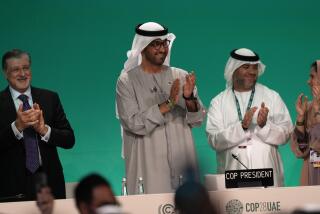G-8 countries focus on energy reforms
AOMORI, JAPAN -- — Faced with record-high oil prices, the world’s leading economies and oil consumers Sunday pledged greater investment in energy efficiency and green technologies to control their spiraling thirst for petroleum.
In a joint statement, energy ministers from the Group of Eight countries, joined by China, India and South Korea, also urged oil producers to boost output, which has stalled at about 85 million barrels a day since 2005, and called for cooperation between buyers and producers.
But with little prospect for a surge in production any time soon, the focus of Sunday’s meeting was on what wealthy nations should do to rein in consumption while reducing carbon emissions blamed for global warming.
“We also have to address too the demand side of the equation,” said John Hutton, Britain’s business secretary. “We will do that through new measures to improve energy efficiency [and] accelerate our moves to a new, low-carbon form of energy generation.”
The 11 nations, which account for 65% of the world’s energy consumption, grappled with oil prices that have hit record highs. Prices surged 8% Friday to $138.54 on the New York Mercantile Exchange.
Energy experts say most producers have little ability to expand output. The exception is Saudi Arabia, which is producing about 9.4 million barrels a day and has the ability to increase by about 2 million barrels a day but has not done so.
The president of the Organization of the Petroleum Exporting Countries, Chakib Khelil, has said the cartel will make no new decision on production levels until its Sept. 9 meeting in Vienna.
Although the nations meeting Sunday did not pledge specific amounts of money, they said they would set goals in line with International Energy Agency recommendations for a vast expansion of investment in renewable energy and energy efficiency.
For instance, the G-8 countries -- the United States, Japan, Russia, Germany, France, Britain, Italy and Canada -- pledged to launch 20 demonstration projects by 2010 on so-called carbon capture and storage, which would enable power plants to catch emissions and inject them into underground storage spaces.
The Sunday meeting followed a statement from five top energy consumers -- the U.S., Japan, China, India and South Korea -- that warned that high prices were a menace to the world economy and that more petroleum should be produced. They said the unprecedented prices were against the interests of both producers and consumers and imposed a “heavy burden” on developing countries.
The group, however, diverged over oil subsidies. The International Energy Agency has estimated that oil subsidies in China, India and the Middle East totaled about $55 billion in 2007. The United States urged countries such as China to lower oil supports, which buoy demand, but poorer developing nations said removing subsidies could trigger unrest.
More to Read
Sign up for Essential California
The most important California stories and recommendations in your inbox every morning.
You may occasionally receive promotional content from the Los Angeles Times.










